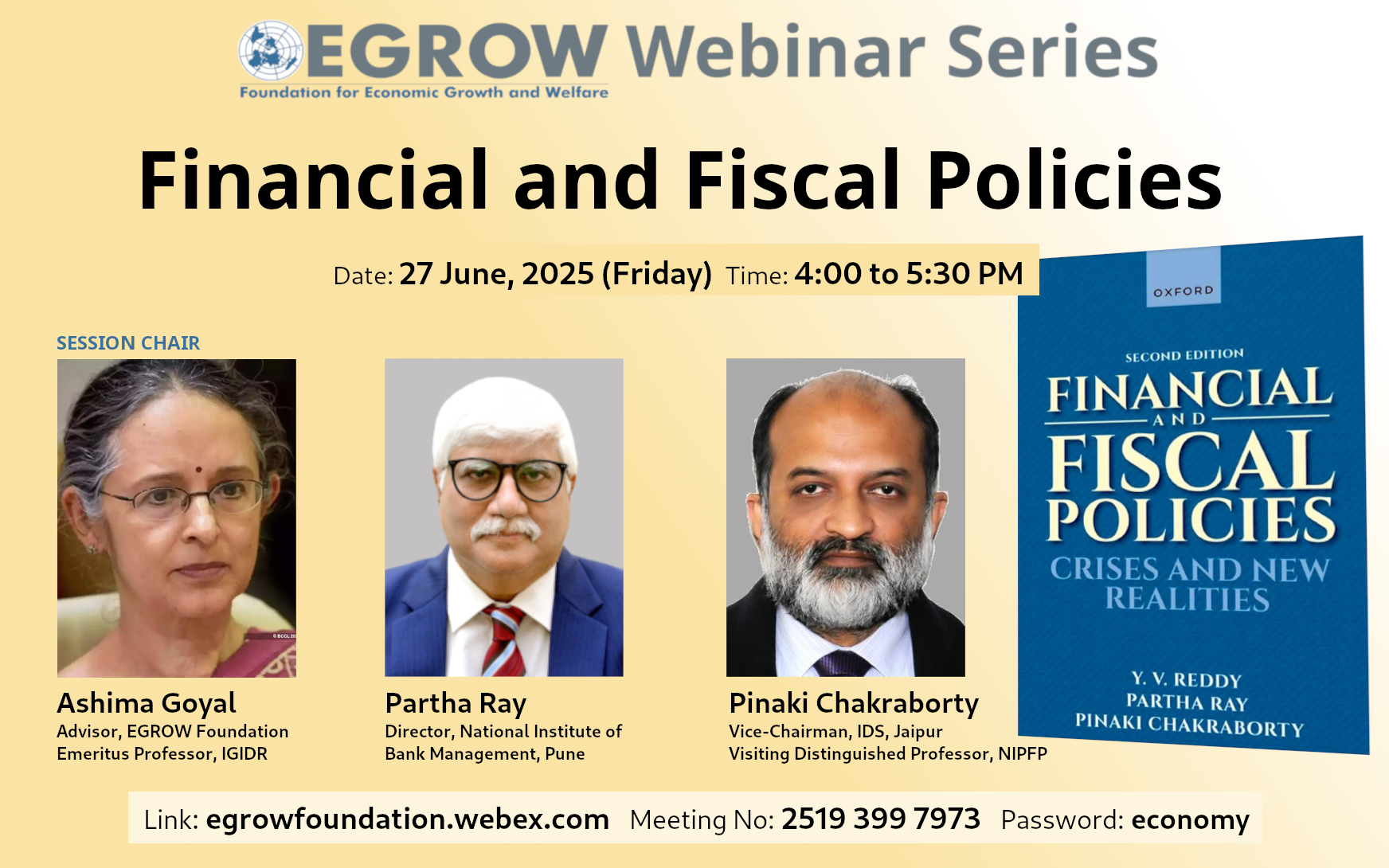Financial and Fiscal Policies

Webinar Link
Meeting No: 2519 399 7973
Password: economy
Certificate of Participants
To recieve certificates, please register and attend
Abstract
The 2007 U.S. sub-prime mortgage crisis triggered a global recession, later evolving into broader economic and political challenges, followed by the euro area debt crisis. While 2014–2019 saw a modest recovery, global growth remained fragile amid the U.S.–China trade war and Brexit uncertainty. The COVID-19 pandemic in 2020 led to renewed fiscal and monetary interventions.
This webinar shall delve into the interplay of monetary, fiscal, and financial policies, with focus on public debt, taxation, sovereign restructuring, financial regulation, and sub-national finance—drawing lessons from the euro area and India to guide future institutional frameworks.
About the Speakers
Ashima Goyal
Ashima Goyal is Advisor at EGROW Foundation. She has provided consultancy to ADB, DEA, GDN, UNDP, RBI, UN ESCAP and WB. She is active in the Indian policy debate; and has served on several government committees, including the Economic Advisory Council Prime Minister and the RBI technical advisory committee for monetary policy, and boards of educational and of financial institutions. She is former Member of RBI's Monetary Policy Committee, an independent director at Edelweiss Financial Services and SBI General Insurance.
She edits a Routledge journal in macroeconomics and finance and contributes a monthly column to the Hindu Business Line. She was a visiting fellow at the Economic Growth Centre, Yale University, USA, and a Fulbright Senior Research Fellow at Claremont Graduate University, USA. Her research has received national and international awards. She won two best research awards at GDN meetings at Tokyo (2000) and Rio de Janeiro (2001), was selected as one of the four most powerful women in economics, a thought leader, by Business Today (2008); was the first Professor P.R. Brahmananda Memorial Research Grant Awardee for a study on History of Monetary Policy in India since Independence (2011), which was published by Springer in 2014; received the SKOCH Challenger Award for Economic Policy (2017); Hindu College OSA Distinguished Alumni Award and 20th FLO FICCI GR8 Beti Award for Excellence in Economics (2018).
Ashima Goyal is widely published in institutional and open economy macroeconomics, international finance and governance, with more than a hundred articles in national and international journals. She has also authored and edited a number of books including Macroeconomics and Markets in Developing and Emerging Economies (Routledge: UK. 2017) and A Concise Handbook of the Indian Economy in the 21st Century (OUP: India, 2019).
Partha Ray
Dr Partha Ray is Director National institute of Bank Management. His research interests Macroeconomics ,India and the Global Economy ,Issues in Monetary Policy ,Crisis and Contagion: Contemporary Challenges to Macro-Financial Policies ,Global Political Economy. He is working as Director, Department of Economic and Policy Research, Reserve Bank of India, Mumbai, Adviser to Executive Director, International Monetary Fund, Washington D.C and Professor, Indian Institute of Management Calcutta (2011 – April 2021).
He is Working also various projects "State Finance of West Bengal", for NITI Aayog in 2018, “Fiscal Implications arising out of Implementation of Fifth and Sixth Pay Commission on Finances of Union and State Governments (with special reference to committed liabilities, tax and non-tax revenue and debt sustainability)” for Seventh Central Pay Commission in 2014, “Gold as a Formal Investment Asset: Possible Contours of a People Oriented Gold Policy in India” for World Gold Council in 2013.
Dr Partha Ray hold Ph.D.(Economics) University of Mumbai, India, Certificate in Advanced Management Programme, University of Oxford, UK , PG Diploma in Development Policy, Indira Gandhi Institute of Development Research, Mumbai, India, MSc. (Economics): University of Calcutta, India, BSc (Economics): Presidency College, Calcutta, India.
Pinaki Chakraborty
Pinaki Chakraborty is a Visiting Distinguished Professor at NIPFP and the Vice-Chairman of the Institute of Development Studies, Jaipur. Prior to this, he was the Director and Professor, National Institute of Public Finance and Policy, New Delhi, and Economic Advisor to the Fourteenth Finance Commission of India.
He served as Member, Advisory Council to the Fifteenth Finance Commission of India; Member-Secretary, Committee on Fiscal Statistics appointed by the National Statistical Commission; Chairman, Kerala Public Expenditure Review Committee—a statutory committee appointed by the Government of Kerala; and Research Associate, Levy Economics Institute, New York. He also served as Member of the Third Union Territory Finance Commission, appointed by the Ministry of Home Affairs, and as Consultant to the Eleventh Finance Commission of India. He was Chief of Social Policy at UNICEF and the Chief of Field Office at UNICEF Kerala and Tamil Nadu.
Chakraborty has held short-term visiting positions in the Department of Economics at the University of Ottawa, the University of Carleton, the Centre for Development Studies, Trivandrum, and also taught the Indian Public Finance module at the Indira Gandhi Institute for Development Research, Mumbai.
He testified before the Select Committee of the Upper House of India Parliament in June 2015 on the Constitution Amendment Bill on GST. His book titled “GST in India: A Simple Tax in a Complex Federal System” was published by Orient Back Swan in 2019. He has also researched extensively on the decentralization and development of states in India. He has co-authored two books titled “State Level Reforms, Growth, and Development in Indian States” published by the Oxford University Press in New York in 2014 and “Social Sector in a Decentralised Economy: India in the Era of Globalization,” published by Cambridge University Press. He regularly publishes in various national and international journals. He has an MPhil in Applied Economics and a PhD in Economics from the Centre for Development Studies, Trivandrum.